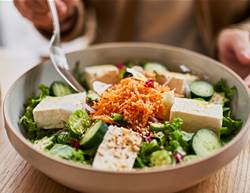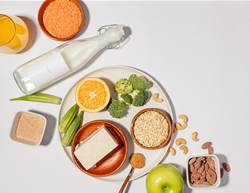- Adding table salt to your food may increase your risk of stomach cancer, a new study shows.
- Researchers found that participants who “always” added salt to food had a 41% higher risk of stomach cancer compared to those who “never/rarely” added salt.
- Experts explain the findings and what to do to lower your risk of stomach cancer.
You may want to think twice before picking up that salt shaker. Previous research has shown that adding salt to your food could lead to a shorter life expectancy. Now, researchers have found that adding the tasty seasoning to your plate could increase your risk of developing stomach cancer by 41%.
A study published in Gastric Cancer used data from 471,144 people in the UK Biobank to determine how consuming salt impacted stomach cancer risk. Participants reported the frequency of adding salt to food at the table and 24-hour urinary sodium levels were estimated using INTERSALT formulae. Over an average follow-up of 10.9 years, 640 cases of gastric cancer were recorded.
Researchers found that those who “always” added salt to food (note, the study did not provide numbers for frequency here) had a 41% higher risk of developing gastric cancer compared to those who “never/rarely” added salt. There was also a strong correlation between 24-hour sodium levels and how often people added salt to food. However, researchers found no strong association between estimated 24-hour urinary sodium levels and gastric cancer risk.
The study suggests that always adding salt to food at the table is associated with a higher risk of gastric cancer, explains gastroenterologist Dr Andrew Boxer.
Studies have shown an association of salt intake with increased risk of gastric cancer but the mechanism of why this occurs isn’t clear, says gastroenterologist Dr Austin Chiang. “Some have proposed that salt [leads to] higher rates of H. pylori bacterial infection, [which occurs when Helicobacter pylori (H. pylori) bacteria infect your stomach, which then can lead to ulcers and eventually cancer].” Another possibility would be that certain salty foods have other properties that are associated with increased cancer risk, he explains.
Dr Boxer also notes that the relationship between salt intake and stomach cancer could be due to inflammation. “Persistent exposure to high levels of salt can lead to sustained inflammatory responses and oxidative stress within the [stomach lining].” This chronic inflammatory environment promotes genetic mutations that are critical in the development of gastric cancer, he explains.
But salt isn’t always bad, and it’s not the only aspect that may correlate with stomach cancer. The most common risk factors for gastric cancer include H. pylori bacterial infection, smoking, alcohol use, obesity and a family history of gastric cancer, says Dr Chiang.
“There are also underlying diseases that can predispose individuals to gastric cancer like chronic atrophic gastritis, a type of long-term inflammation of the stomach lining,” he notes. Dr Boxer also points out that as well as salt-heavy diets, meal plans deficient in fresh fruits and vegetables, which provide protective antioxidants and vitamins, further exacerbate your risk for gastric cancer.
But not all hope is lost; some of the risk factors may be modified, says Dr Chiang. “Avoiding smoking and alcohol use, and eating a balanced, diverse, high-fibre diet can help reduce one’s risk of stomach cancer.”
By mentioning any family history of stomach cancer to your doctor, they can also recommend appropriate tests if necessary, he advises. Dr Boxer agrees and notes that cutting back on salty, smoked, cured and preserved foods that contain nitrates may also lower your risk for stomach cancer.
The bottom line
In this study, there was an association between those who reported “always adding salt” to their diet and having higher rates of gastric cancer compared to those who reported “never/rarely” adding salt to their food, says Dr Chiang. “However, this finding is only an association and causation could not be established,” he points out, meaning that we don’t know for sure if salt causes stomach cancer.
Further studies, particularly those including diverse populations, are needed to clarify the association between salt intake and gastric cancer risk, adds Dr Boxer.
If you crave briny foods, some studies indicate that adding a salt substitute, like one that contains potassium chloride and sodium chloride, may lower your risk of some serious health issues, such as heart attack and stroke. So if you’re still craving salt at mealtime, consider making the switch.



.jpg&h=90&w=90&c=1&s=1)






